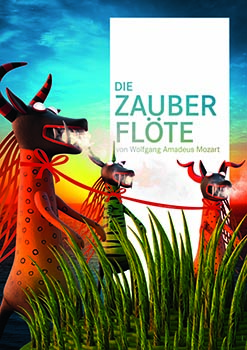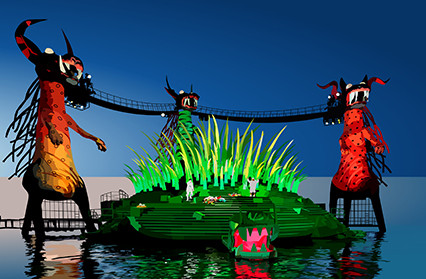
Bregenz Festival, Opera on the Lake, Aug 2 2014
Wiener Symphoniker and Prager Philharmonischer Chor
Conductor: Patrick Summers
Director: David Pountney
Stage Designer: Johan Engels
Costume Designer: Marie-Jeanne Lecca
Stunt and Action Choreographer: Ran Arthur Braun
Puppetry: Blind Summit Theatre
Lighting Designer: Fabrice Kebour
Cast includes:
Alfred Reiter / Norman Reinhardt / Daniela Fally / Bernarda Bobro / Markus Brück / Hanna Herfurtner / Martin Koch / Wilfrid Staber / Eleftherios Chladt
Plus live singers from the Festspielhaus, acrobats and stunt performers, puppeteers and doubles.
Mozart’s final opera Die Zauberflöte – The Magic Flute – has enthralled audiences since its first performance in Vienna in 1791. Generically, the opera is a Singspiel; the culmination of a popular Austro-German tradition of music-theatrical works which combined song with spoken dialogue, and which Mozart now took to new heights of comedic entertainment, romantic fantasy and sheer musical and dramatic power. Anyone who loves opera will know The Magic Flute intimately well – and yet, somehow, not at all; and therein lies its continued magnetic pull. Because, as director David Pountney suggests, the work is not just richly multilayered, but full of enigmas, and robustly capable of supporting a variety of interpretations – including some of which Mozart and his librettist Schikaneder would never have dreamed.
In historical and philosophical terms, it is the esoteric symbolism of ‘Flute that has elicited the most excitement and controversy over the years. There is nothing quite like the hint of secret cult or hidden code to get the theorist’s pulse racing – especially when combined with Mozart’s seemingly baffling genius – and the frisson of mystery continues to surround the opera’s supposed Masonic subtext. Over the years, the interpretative trail has wound its way through Gnosticism, alchemy, the Kabbalah, numerology and Rosicrucian mysticism – although stopping short of divine or extra-terrestrial intervention as far as I am aware.
Scholars have pointed on the one hand to the opera’s didacticism and solemn moralising and, on the other, to the often subtle irony with which Mozart seems to undercut the high seriousness – and, indeed, the high silliness – of the libretto (reputedly, Mozart did not even care for the flute as an instrument, which adds yet another fascinating aside to this endless story). And of course, there remains the not-so-small point that the theatrical foundations of Singspiel were as a straightforward vehicle for popular comedy and/or fairytale. Mozart himself referred to ‘Flute as a ‘teutsche Oper’ (‘teutonic’ in the sense of ‘for the people’), whilst Schikaneder called it a ‘grosse Oper’ (a ‘large’ opera); something never intended for intellectuals.
However, whichever way you look at it, The Magic Flute is ultimately bursting with Enlightenment ideals, optimism and vigour, as we see the freethinking, rational individual win out over the dark archaism of a superstitious, authoritarian collective. Traditionally, the evil is seen as embodied by the Queen of the Night; the mother who not only abandons her daughter Pamina, but who exhorts her to murder and who attempts to set up her sacrificial rape and marriage when she fails to comply. In Pountney’s utterly spellbinding production, Daniel Fally could be more than forgiven the odd vocal wobble in rising to the challenge of the role in more ways than one. Raised especially high above the lake and stage to deliver ‘that’ famous aria, Fally defied both the elements and gravity with cool venom, her coloratura top ‘Fs’ triumphing in a perilous high-wire act indeed.
The Queen should, of course, be a dramatic highlight of the ‘Flute wherever it is staged. But here on Lake Constance, Pountney’s production is breathtaking from the start, and not just because of the exquisite sunset lake with its distant shore lights and rippling reflections, nor the ravishingly lit, giant forest of waving grass and tumbling, abseiling creatures – nor even because of the floating hands and turtles, the hissing serpents or mighty Dragondogs which tower and blaze with fire over all in Johan Engel’s spectacular stage design. For this is opera as carnival for the mind as well as for the senses; a glorious circus of imagination and metaphysical reverie.
Pountney has created a fantastical, Shakespearean island of dreams and nightmares – and, more than that, of a very real existential struggle. Far from being the noble representative of a dawning Age of Reason as he is usually seen (and as Mozart no doubt saw him), Sarastro (sung with dark disquiet by Alfred Reiter) is contemptuous, rigid and despotic; it is he who imprisons Pamina (Barnarda Bobro in alternately feisty or innocent, ‘Sound of Music‘ guise), and he who uses her for barter; he who enforces his own brand of trial-by-element in an atmosphere of arcane ritualism, and he who, in an echo of the Queen, casually orders the torture of Monostatos for daring to disobey him. Here, Sarastro’s temple entourage are fanatical minions: part animal, part sci-fi alien thanks to stunning costumes by Marie-Jeanne Lecca, and some suggestive choreography by Ran Arthur Braun. There are echoes of King Kong in Pamina’s being tied up as sacrificial virgin on this island of primitive creatures – whilst Monostatos himself (portrayed with requisite slime by Martin Koch), becomes more, even, than a twisted servant, but a lizard-like Mr Hyde to Sarastro’s Dr Jekyll as he slips off the arriving boat in the opening scene to pilfer for his master the seven-fold seal of the Queen’s dead husband.
In this production, the opera not only looks backwards and forwards in time, but sideways and obliquely at other worlds and other possibilities, some desirable and some very much not so. The human contact is touching and convincing against a backdrop of huge, malignant marionettes; the Three Ladies are at once terrifying and beautiful in the hands of the Blind Summit puppeteers, and the Three Boys – danced and mimed live on stage but, like the Three Ladies, sung from off-stage alongside the orchestra – are scarcely less disturbing with their bulbous, Alice in Wonderland great, bald heads. And yet it is all wondrous; a spectacle quite fit for children of all ages to marvel at and enjoy.
The duet between Pamina and Papageno (the wonderful, scene-stealing Markus Brück) is a clear vocal and humanist high point. Interestingly, it is they – not the courting couples – for whom Mozart writes the nearest to an extended romantic duet in the entire opera. Here in fact, we glimpse the possibility of a successful loving friendship, not just between a man and a woman, but between people of usually distant social classes. Papageno himself inevitably looms large and slap-stick with his birdie regalia and rustic charm; a cheeky-chap foil to Tamino’s determined heroism and willingness to take the rules extremely seriously (this evening, Tamino was sung with simple, affecting skill by Norman Reinhardt).
There is always room for muddlement and whimsy in Mozart’s brave, new-thinking world – thank God or, as Carolyn Abbate has noted,* those stagey musical ‘effects’ with bells and flutes and unearthly, trilling soprano might threaten to usher in a further tyrannical, because mechanistically inhuman, age. But of course, Papageno ultimately wants to play by the rules too; to settle down to a quiet family life with his beloved Papagana (performed here by Hanna Herfurtner – who had the audience in stitches in her ‘old woman’ guise as a kind of Mad Hatter tea-lady). Papageno, of all characters, is ultimately here to comfort us with his down-to-earth naturalism and resistant foolish cheer in the face of unknown dangers; a crucial key, perhaps, to Mozart’s dramatic resolution, and which underpins the character’s own otherworldly guise.
Musically, the production struck me as beautifully, simply, more than fit for purpose. The singers performed admirably, with an attention to detail and engagement with the audience that was astonishing given the challenges of the environment. On the evening I attended, the wind gradually picked up as lightning flashed around the lake, before driving some truly horizontal rain across the set and stalwart cast. Unless you really are dead-eyed, you don’t go to this unique opera-on-the-lake to pick holes with tempi (for those who wish to know, they were often on the slow side compared to current Mozart fashions) – but perhaps to rejoice in the necessary editing that cut out some of the more ponderous moments of the opera (duetting priests, for example) and worked in favour of a tight show without fluff or interval. The Vienna Symphony performed with laudable sensitivity under the baton of Patrick Summers, and their sound, together with the singers – who were all amplified of course, whether on stage or off – was magnificently clear and balanced through the speaker system.
Here we were, in provincial, modern-day Bregenz, with an array of new technology to astound us and – way beyond that – to assist the possibilities of new global understanding. But perhaps we were not so far from the ‘Flute’s bittersweet Viennese beginnings after all. The final denouement in Pountney’s production, just as he promised, involves the destruction of the old order as the two young couples emerge triumphant into their new, Rousseauian world of equality and freedom. Our champions have travelled through and overcome a fantastical dystopia to win the possibility of… well, perhaps not entirely a utopia; after all, clemency may have been a much-touted virtue in the Josephenian Enlightenment, but none is shown here to the actual figures of the old guard, who perish along with their world. Nonetheless, the finale is the happiest of happy waving celebrations, as members of the chorus (the redoubtable Prague Philharmonic Choir) pop out to stand in the aisles in Eurovision rainbow garb, and to bounce big white balls into and over the audience. It is a great, celebratory moment after a wondrous journey, and one which cannot fail to capture your heart, even as the production has fed in spectacular fashion your senses, and your mind along the way.
*In Search of Opera, Princeton University Press, 2001
original illustration by Dean Lewis
With thanks to Wales Arts International for their generous support.











